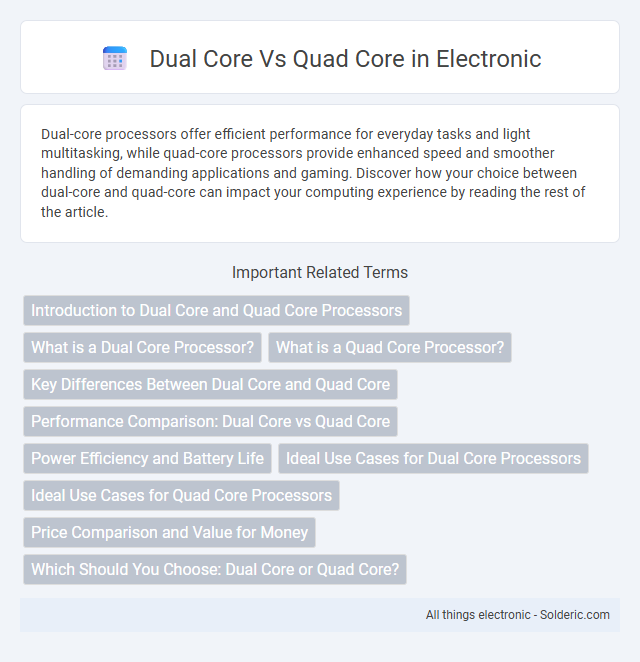Dual-core processors offer efficient performance for everyday tasks and light multitasking, while quad-core processors provide enhanced speed and smoother handling of demanding applications and gaming. Discover how your choice between dual-core and quad-core can impact your computing experience by reading the rest of the article.
Comparison Table
| Feature | Dual Core | Quad Core |
|---|---|---|
| Number of Cores | 2 cores | 4 cores |
| Performance | Good for basic tasks and light multitasking | Better for heavy multitasking and demanding applications |
| Power Consumption | Lower power usage, more energy efficient | Higher power consumption, more heat generated |
| Cost | Generally cheaper | More expensive due to higher core count |
| Use Case | Basic computing, web browsing, office tasks | Gaming, video editing, software development, multitasking |
Introduction to Dual Core and Quad Core Processors
Dual core processors feature two independent cores that handle tasks simultaneously, improving multitasking and overall system efficiency compared to single core designs. Quad core processors contain four cores, further boosting performance by enabling more parallel processing, ideal for demanding applications like gaming and video editing. Understanding the differences between dual core and quad core helps you select the right processor based on your computing needs and workload intensity.
What is a Dual Core Processor?
A dual core processor contains two independent cores on a single chip, allowing it to execute multiple tasks simultaneously and improve multitasking performance compared to single-core processors. Each core can handle separate processing threads, which enhances overall speed and efficiency for everyday computing and moderate workloads. Dual core processors are commonly found in laptops, budget desktops, and older smartphones, balancing power consumption and performance.
What is a Quad Core Processor?
A quad core processor features four independent cores capable of executing tasks simultaneously, significantly enhancing multitasking performance and speed compared to dual core processors. Each core operates as a separate processing unit, allowing for improved efficiency in handling parallel computing tasks, gaming, and multimedia applications. Quad core CPUs are preferred in high-performance computing environments where complex and resource-intensive applications demand better processing power.
Key Differences Between Dual Core and Quad Core
Dual core processors feature two independent cores to handle tasks simultaneously, boosting multitasking efficiency, while quad core processors include four cores, offering enhanced performance for demanding applications and smoother multitasking. Quad core CPUs excel in parallel processing and gaming performance, leveraging increased thread management compared to dual core's limited multitasking capacity. The choice between dual core and quad core impacts power consumption, with dual core typically using less energy, whereas quad core processors deliver superior computational power for complex workloads.
Performance Comparison: Dual Core vs Quad Core
Quad core processors deliver significantly better multitasking and parallel computing performance compared to dual core CPUs, thanks to having twice the number of cores handling simultaneous threads. In benchmarks and real-world applications, quad core chips excel in CPU-intensive tasks such as gaming, video editing, and 3D rendering, offering faster processing speeds and improved responsiveness. Dual core processors remain adequate for basic computing needs, but quad core units provide higher overall performance and efficiency under demanding workloads.
Power Efficiency and Battery Life
Dual-core processors generally offer better power efficiency and longer battery life compared to quad-core processors because they consume less energy by managing fewer active cores, making them ideal for lightweight tasks and extended usage. Quad-core processors provide higher performance for multitasking and demanding applications but tend to drain battery faster due to increased power consumption from running multiple cores simultaneously. Optimizing laptop or smartphone usage by balancing task load with processor type can significantly enhance battery longevity without compromising necessary performance.
Ideal Use Cases for Dual Core Processors
Dual core processors excel in tasks like web browsing, office applications, and lightweight gaming, providing efficient performance for everyday computing needs. They are ideal for budget-conscious users who prioritize energy efficiency and longer battery life in laptops or compact desktops. Your system benefits from lower heat output and power consumption while handling basic multitasking and media playback smoothly.
Ideal Use Cases for Quad Core Processors
Quad core processors excel in multitasking and demanding applications such as video editing, 3D rendering, and gaming where multiple threads run simultaneously. They offer enhanced performance for users running virtual machines, complex simulations, or software development environments with heavy code compilation. Ideal for professionals and enthusiasts needing efficient handling of parallel processing workloads, quad core CPUs provide superior responsiveness and smoother multitasking compared to dual core processors.
Price Comparison and Value for Money
Dual core processors generally offer a lower price point compared to quad core processors, making them a budget-friendly option for basic computing tasks and everyday use. Quad core processors provide better performance and multitasking capabilities, delivering greater value for money in gaming, content creation, and intensive applications where higher processing power directly translates to increased efficiency. Consumers should balance their performance needs with budget constraints, as quad core CPUs typically justify their higher cost through superior speed and enhanced multitasking potential.
Which Should You Choose: Dual Core or Quad Core?
Choosing between dual core and quad core processors depends on your computing needs and workload intensity. Dual core CPUs efficiently handle everyday tasks like browsing and office applications, offering better power efficiency and cost-effectiveness. Quad core processors excel at multitasking, gaming, and demanding software, delivering higher performance and smoother user experience for power users.
dual core vs quad core Infographic

 solderic.com
solderic.com